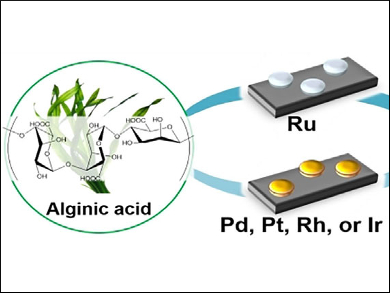The production of useful compounds from renewable feedstocks is important for the development of sustainable chemistry. Lignocellulosic biomass has been used for many such processes, but other biomass sources could be even more useful due to, e.g., faster growth. Biomass derived from algae, for example, can be used to produce a variety of value-added chemicals.
Do Heui Kim, Seoul National University, Republic of Korea, and colleagues have developed a process for the hydrolytic hydrogenation of alginic acid (pictured), derived from macroalgae, to produce sugar alcohols, mainly sorbitol and mannitol. Sorbitol and mannitol can be used both as sweeteners and as building blocks for the chemical industry. The team used carbon-supported noble metals (Ru, Pd, Pt, Rh, or Ir) as catalysts. The hydrogenation was performed in a stainless-steel autoclave charged with alginic acid, water, and the respective catalyst that was pressurized with 50 bar of hydrogen.
The highest yield of C6 sugar alcohols was obtained over ruthenium supported on carbon (sorbitol: 29 %; mannitol: 28 %; galactitol: 4 %). According to the researchers, the method could reduce the dependence on lignocellulosic biomass for the sustainable production of sugar alcohols.
- Catalytic Hydrogenation of Macroalgae-derived Alginic Acid into Sugar Alcohols,
Chunghyeon Ban, Wonjin Jeon, Hee Chul Woo, Do Heui Kim,
ChemSusChem 2017.
DOI: 10.1002/cssc.201701860




